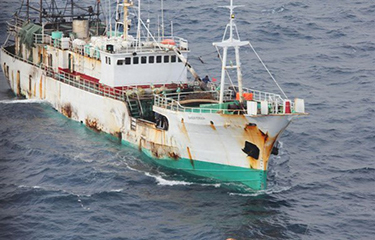A half-dozen U.S. senators say that NOAA’s plan to expand the Seafood Import Monitoring Program (SIMP) doesn’t go nearly far enough and are asking the agency to revise its proposal.
“The proposed rule is far too narrow in scope,” the lawmakers wrote in a letter to U.S. regulators. “As SIMP currently only requires catch documentation and traceability for approximately 45 percent of seafood imports, there is a need to include all imported seafood according to the U.S. government’s intent.”
“Without catch documentation and traceability requirements for all seafood, IUU-derived and fraudulently labeled products will continue to enter U.S. markets,” they added.
First adopted in 2016, SIMP is a regulatory effort to prevent seafood resulting from illegal, unregulated, and unreported (IUU) fishing from entering U.S. markets. The program requires documentation and inspection of 13 select species or species groups brought by foreign producers to U.S. ports, theoretically ensuring imported seafood is held to the same sustainability and labeling requirements as domestic seafood producers.
In December 2022, NOAA Fishers announced a proposal to double the number of species targeted by SIMP. The expansion would also add electronic reporting requirements.
In their joint letter, U.S. senators Richard Blumenthal (D-Connecticut), Ben Cardin (D-Maryland), Martin Heinrich (D-New Mexico), Edward Markey (D-Massachusetts), Jeff Merkley (D-Oregon), Elizabeth Warren (D-Massachusetts), and Roger Wicker (R-Mississippi) said the proposed expansion is too limited. SIMP should cover all imported seafood, the legislators argue, and NOAA should work with other U.S. agencies and international groups to crack down on IUU fishing.
“As the United States is the world’s largest seafood-importing country, we have both the purchasing power and the responsibility to tackle illegal, unreported, and unregulated (IUU) fishing and human rights abuses in the fishing industry,” the lawmakers wrote. “We request that NOAA issue a revised proposed rule because of the lack of interagency and stakeholder consultation, the failure to disclose the method used for additional species selection, and the failure to meet the requirements of the FY23 National Defense Authorization Act (NDAA) and the National Security Memorandum on Combating IUU Fishing and Associated Labor Abuses.”
The U.S. imports approximately 85 percent of its seafood, and eliminating IUU imports would boost the operating income of the domestic commercial fishing industry by USD 60.8 million (EUR 56.7 million), according to the International Trade Commission.
NOAA’s proposed expansion has faced criticism from both directions, with some producers arguing SIMP is ineffectual, while others have long called for the regulation to be extended to all seafood imports.
“The proposed rule is a disappointment. It does the bare minimum and provides little evidence why certain species were chosen and others ignored,” Stimson Center Senior Fellow and Director of the Environmental Security Program Sally Yozell said in public comments on the proposal. “It does not go far enough to address the problems of illegal and fraudulent seafood imports entering the U.S. market or address labor concerns.”
The National Fisheries Institute, in contrast, has stated repeatedly that SIMP hasn't actually combated IUU effectively.
“The simple fact is that in over five years of operation, SIMP has demonstrably failed to identify and halt shipments of illegally harvested or mislabeled product at U.S. ports of entry,” National Fisheries Institute CEO Lisa Wallenda Picard said in comments opposing the proposed expansion. “There is no disputing it: The regulatory agency in charge of the regulation has concluded that the regulation does not fulfill its central purpose, a purpose highlighted in numerous agency – and interagency – materials.”
Photo courtesy of NOAA







